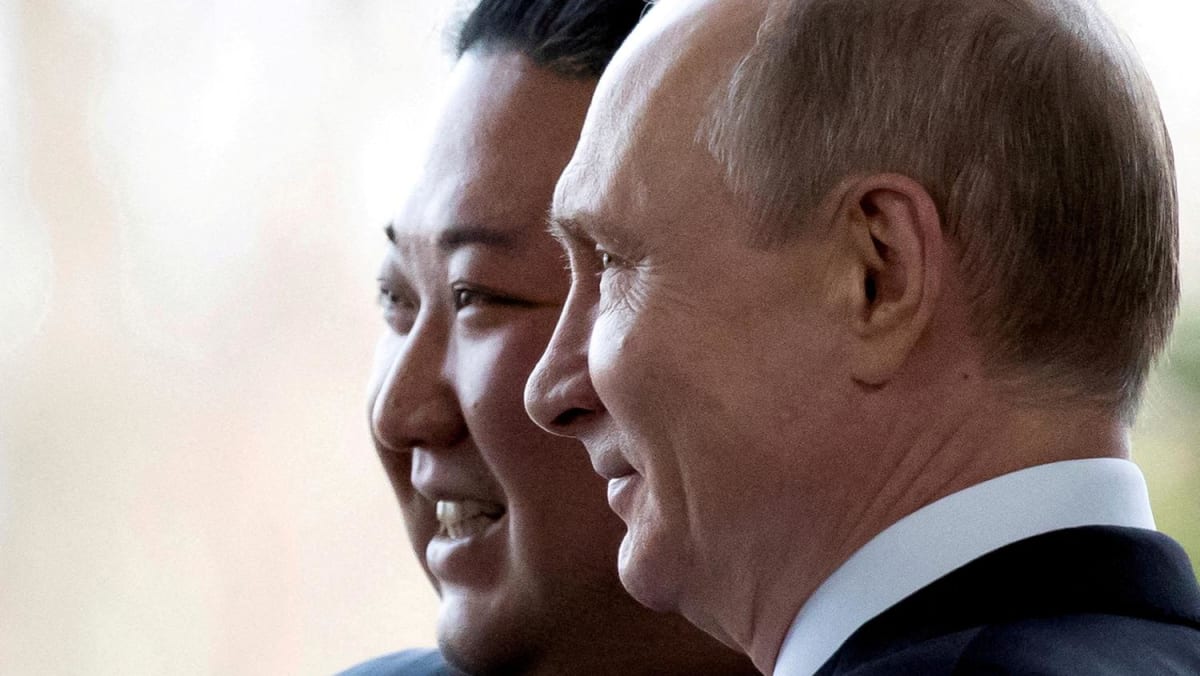
SINGAPORE — North Korea’s leader Kim Jong-Un on Tuesday (Sept 12) crossed the border to Russia on his armoured train for a summit with his Russian counterpart Vladimir Putin.
United States officials said that the two leaders are likely to discuss an arms deal as Russia faces a Ukrainian counter-offensive in a war between the two neighbours which has dragged on for about 18 months.
Russia later insisted that Mr Kim’s visit is purely to strengthen bilateral ties.
Political analysts told TODAY that the meeting may cause global geopolitics to become even more tense and complicated, with countries needing to take greater care to stay neutral in this uncertain environment.
TODAY takes a closer look at what this summit is about, its implications on the Ukraine war as well as what it means for the rest of the world.
THE MEETING
According to Mr Putin’s press secretary Dmitry Peskov, the meeting will be a full-scale visit to strengthen ties.
“There will be negotiations between two delegations, and after that, if necessary, the leaders will continue their communication in a one-on-one format,” he said.
The Kremlin spokesperson also dismissed US warnings on any arms deal between the two countries.
However, political analysts remained sceptical over this denial.
Dr Nah Liang Tuang, a research fellow at the Institute of Defence and Strategic Studies at the S Rajaratnam School of International Studies, told TODAY that the exchange of munitions is likely to be on the agenda.
“Quite frankly, it would be a fairly accurate guess to say that this summit is seeking to exchange North Korean munitions,” he said.
This weaponry likely included artillery shells, short range unguided rockets, mortar ammunition and other explosive ordinance.
In return, Russia would likely offer oil, natural gas, food and “most worryingly of all, nuclear and missile technology and know-how,” he said.
Associate Professor Chong Ja Ian from the National University of Singapore (NUS), added that this move would suggest that Russia is facing increasing strain in its invasion of Ukraine and from United Nations-led sanctions.
Agreeing, Dr Trisha Craig, a senior lecturer of social sciences (global affairs) at Yale-NUS College in Singapore, said that the Kremlin’s miscalculation about the length and cost of the war — which started in February 2022 — has left it desperately short of ammunition.
Ukraine said on Monday that its troops had regained more territory on the eastern and southern fronts in the past week of its counter-offensive against Russian forces.
“As a pariah state faced with international sanctions, it now turns to the isolated ‘hermit kingdom’ to bolster its weaponry to stave off the Ukrainian counteroffensive,” said Dr Craig.
The visit has not been taken well by the US, which warned that any arms deal could trigger US sanctions.
EFFECT ON THE UKRAINE WAR
This potential exchange of artillery could prolong the battle along the warfront, though there will not be much shift in power, experts told TODAY.
Dr Craig said that North Korean artillery is compatible with Soviet-era weapons and Russia will look to acquire as much fire power as possible.
“This is likely to prolong the war, even if it does not mean a dramatic change in the outcome, at least in terms of military capabilities,” she said.
Agreeing, Dr Nah said: “Whatever North Korea sends Moscow will simply be more of the same ammunition that the Russian military has been using against Ukraine, without the former achieving any decisive outcome against the latter.”
As North Korea devotes the “lion’s share” of its military research and development to its missile and nuclear weapons, it lags behind on the “sophistication of its conventional arsenal”, he said.
A conventional arsenal includes weapons and equipment such as armoured combat vehicles, landmines, among other things.
However, Dr Nah noted that “irrefutable proof” of North Korean heavy munitions being sent to Russia may finally trigger both Washington and Berlin to supply Kyiv with longer range Atacms missiles and Taurus cruise missiles respectively.
This could give Ukraine’s military a substantial advantage, he said.
WHAT IT MEANS FOR SINGAPORE
In terms of the wider geopolitical impact, experts said that the visit would have implications for global security, though one said that he does not foresee the summit having any broader impact at all.
Dr Craig from Yale-NUS said that Moscow’s closer ties with Pyongyang would complicate security in the Indo-Pacific region.
“For countries in the region like Singapore, who take great care to stay neutral in the rivalry of the two superpowers, threading that needle may become more difficult,” she said.
Assoc Prof Chong added that the two countries working together to embolden Pyongyang while enabling Russia to continue its aggression in Ukraine means that Singapore’s global and regional environment remains uncertain as major power competition continues to intensify.
“This puts a greater premium on Singapore articulating and implementing a clearer set of foreign policies to its citizens and the outside world,” he said.